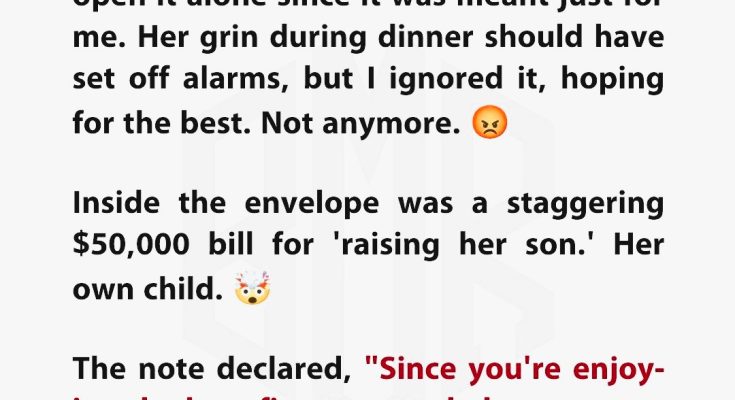I thought I’d seen it all—until my mother-in-law sent me a bill. Not a joke, not a passive-aggressive jab, but a literal invoice for “raising the man I married.” She itemized everything: diapers, school fees, even snacks. I stared at the paper, stunned. My husband, bless him, was equally horrified. “She’s lost it,” he muttered. But I wasn’t angry—I was heartbroken. This wasn’t about money. It was about control, resentment, and a twisted sense of entitlement. I married her son, not her debt. And now, I had to decide how to respond without tearing the family apart.
I called her, calmly. “Is this serious?” I asked. She didn’t flinch. “You married a man I invested in. It’s only fair you reimburse me.” I wanted to scream, but I didn’t. Instead, I asked her to come over. When she arrived, I handed her a counter-invoice—for emotional labor, for hosting her, for every holiday meal I’d cooked. She was speechless. “You’re being petty,” she snapped. “No,” I replied. “I’m matching your energy.” My husband backed me up, and for once, she had no comeback. The silence was glorious.
Days passed. She tried to rally sympathy from relatives, but the story backfired. Everyone was appalled. “You billed your daughter-in-law?” one cousin gasped. “That’s insane.” Her reputation took a hit, and she knew it. Eventually, she called to “clear the air.” No apology, just a vague attempt to reset. I didn’t bite. “Respect is earned,” I said. “Not invoiced.” My husband and I agreed to set boundaries. No more guilt trips. No more financial absurdities. If she wanted a relationship, it had to be built on mutual respect—not manipulation.
Now, every time I see that invoice, I smile. It reminds me that standing up for myself wasn’t just necessary—it was transformative. I didn’t just reject her bill. I rejected the toxic dynamic she’d tried to impose. My marriage is stronger, my voice is louder, and my boundaries are firm. Sometimes, karma doesn’t come in dramatic waves—it arrives in the form of a ridiculous piece of paper that exposes everything. And when it does, you either fold—or you rise.

